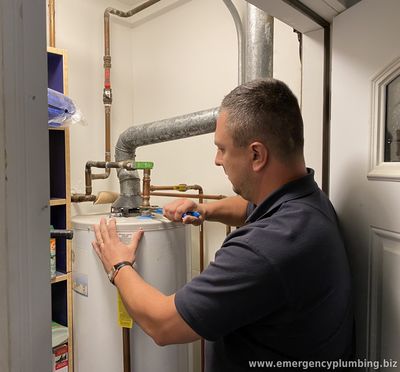Why my water heater rusting and leaking |
Water Heater Troubleshooting: Questions and Answers
At Emergency Plumbing, we understand the frustration of dealing with water heater issues. To help you navigate common problems, we’ve compiled a list of real-life scenarios and expert answers. Whether it’s corrosion, leaks, or rust, we’ve got you covered!
1) What Causes Corrosion on the Top of a Water Heater?
Scenario:Maria in Naperville called us after noticing a whitish, crusty buildup and rust forming on the top of her water heater.
Answer:Corrosion on the top of a water heater is often caused by leaks from pipe fittings, the temperature and pressure (T&P) relief valve, or the cold-water inlet and hot-water outlet connections. The constant presence of moisture allows rust to form, especially if fittings are loose or damaged.
Solution:• Tighten or replace the fittings. • Ensure the T&P valve is functioning properly. • Schedule regular maintenance to prevent leaks and corrosion.
2) My Water Heater Is Leaking from the Bottom. Do I Need to Replace It?
Scenario:Tom in Plainfield noticed water pooling beneath his water heater and asked if a replacement was necessary.
Answer:A leak at the bottom of a water heater can mean several things: • Condensation: This is normal if the water heater is running often in a cool environment. • Drain Valve Issue: A loose or faulty drain valve can cause leaks. • Tank Corrosion: If rust has eaten through the tank, it cannot be repaired.
Solution:• Tighten the drain valve or have it replaced. • If the tank itself is leaking, replacement is the only option. Call Emergency Plumbing for a quick and professional assessment.
3) Why Is My Water Heater Rusting?
Scenario:Kevin from Aurora called after noticing rust stains near the base of his water heater.
Answer:Rust on a water heater is typically due to: • A failing anode rod, which allows rust-causing elements to attack the tank. • Hard water deposits accelerating wear and tear. • Cracks in the glass lining of the tank exposing metal to water.
Solution:• Replace the anode rod every 2-3 years to prevent rust. • Flush the tank regularly to remove sediment. • Treat hard water with a whole-house water softener.
4) Is It Safe to Use a Rusted Water Heater?
Scenario:Susan in Joliet asked if she could continue using her water heater, which had visible rust on the tank.
Answer:A rusted water heater poses several risks: • Tank failure: The tank may eventually rupture, causing water damage. • Water contamination: Rust can discolor and contaminate your hot water. • Safety hazards: A leaking or bursting tank could lead to electrical or fire risks in some cases.
Solution:If you notice rust, do not wait. Contact us at Emergency Plumbing for an inspection to determine if repair or replacement is necessary.
5) How to Fix a Rusted Water Heater?
Scenario:Alex in Schaumburg wanted to know if his rusted water heater could be saved.
Answer:Fixing a rusted water heater depends on the severity of the issue: • Minor rust (on external parts): Sand off the rust and repaint with a rust-inhibiting primer. • Rust caused by a failing anode rod: Replace the anode rod immediately. • Severe internal rust or tank leaks: Unfortunately, the tank must be replaced.
Solution:Our team at Emergency Plumbing can inspect your water heater, replace failing components, and recommend cost-effective solutions, whether it’s repair or replacement.
Why Choose Emergency Plumbing for Your Water Heater Needs?
At Emergency Plumbing, we specialize in: • Water Heater Repairs: Fix leaks, replace anode rods, and clean tanks. • Water Heater Replacement: Upgrade to efficient and reliable models. • New Water Heater Installation: Professional setup for long-lasting performance.
We’re proud to serve our community with fast, reliable service that fits your budget.
Call Emergency Plumbing Today! Don’t let water heater problems disrupt your day. Contact us for expert repair, replacement, or installation services. Schedule your appointment now and enjoy peace of mind with your hot water system!
|


Comments
Post a Comment